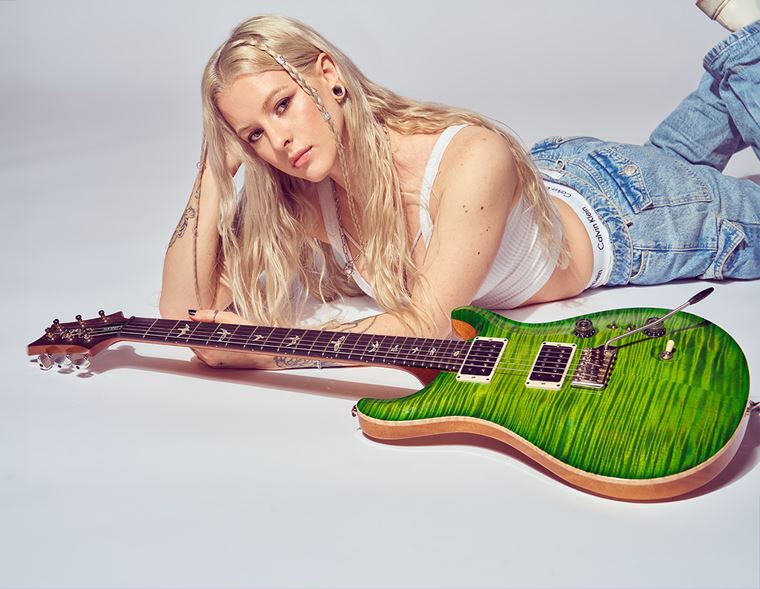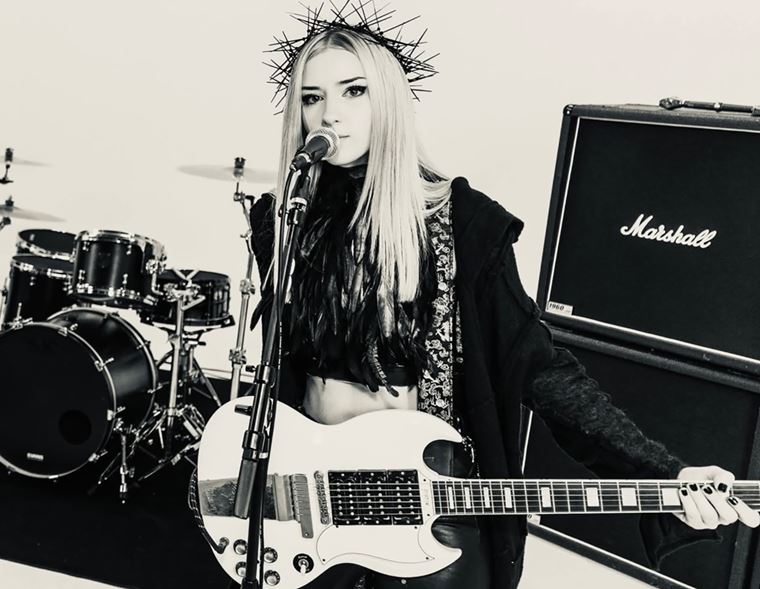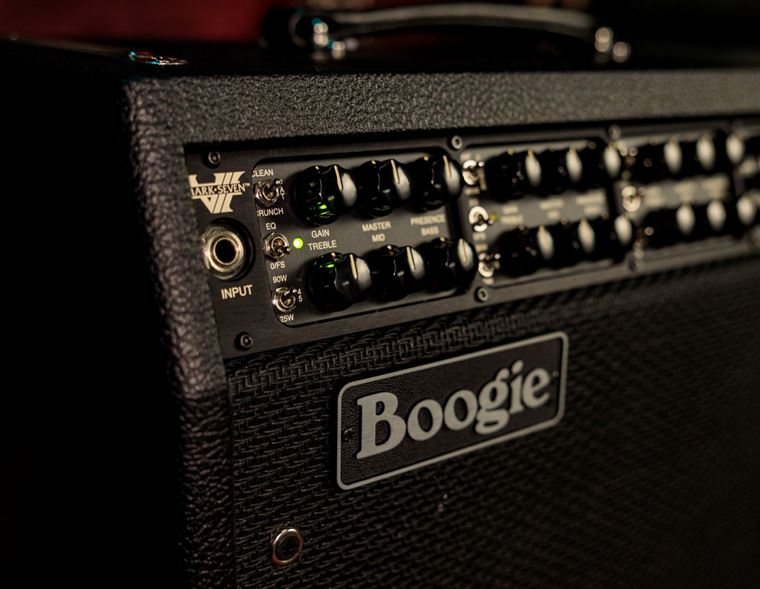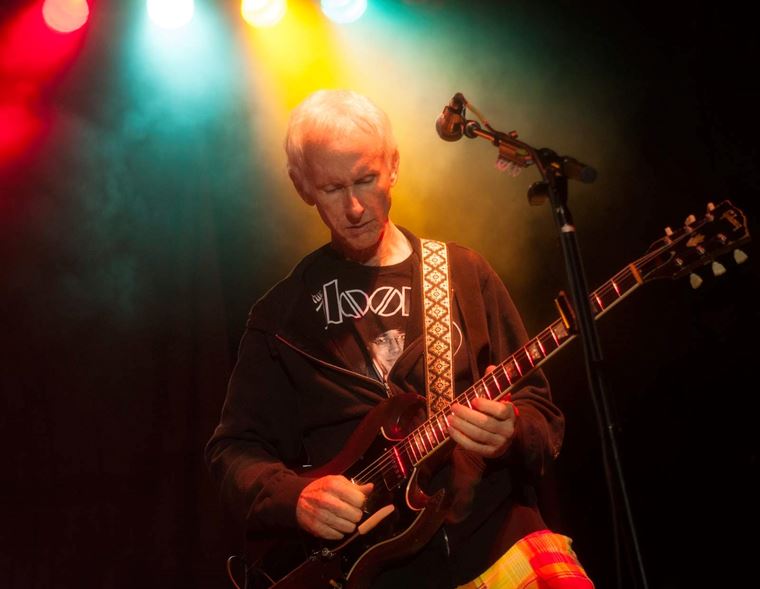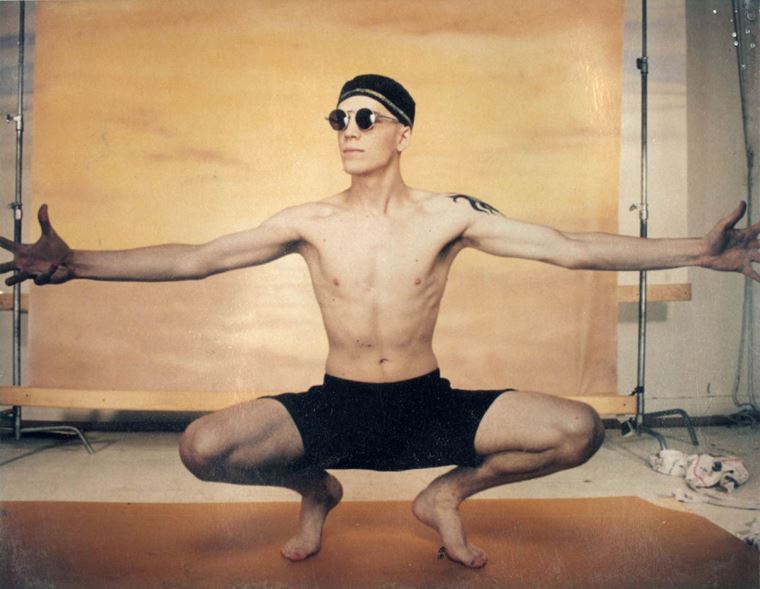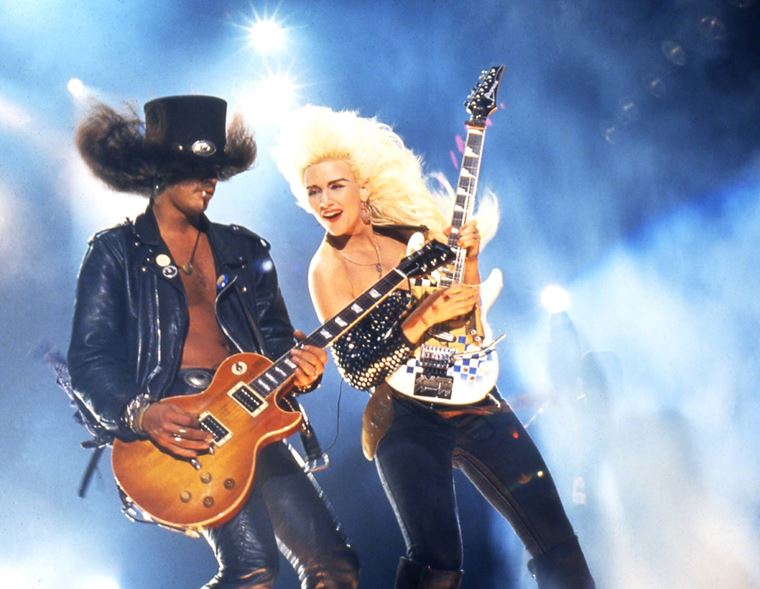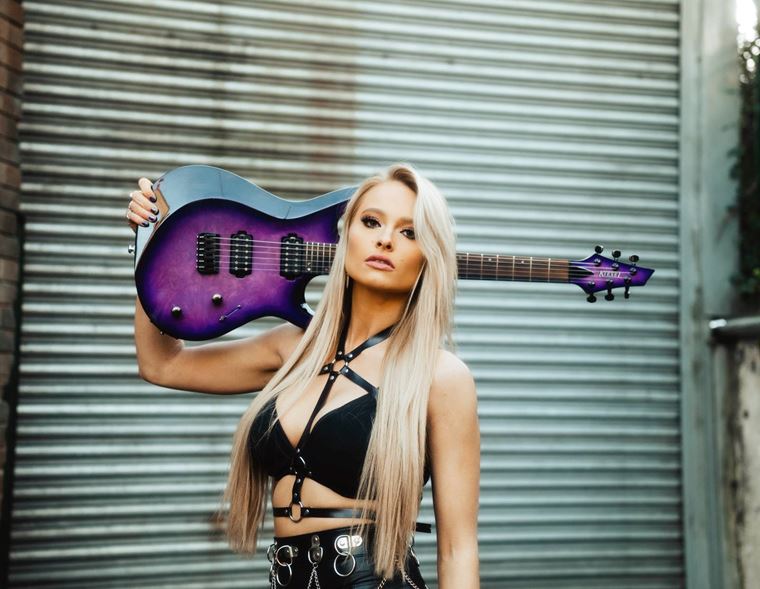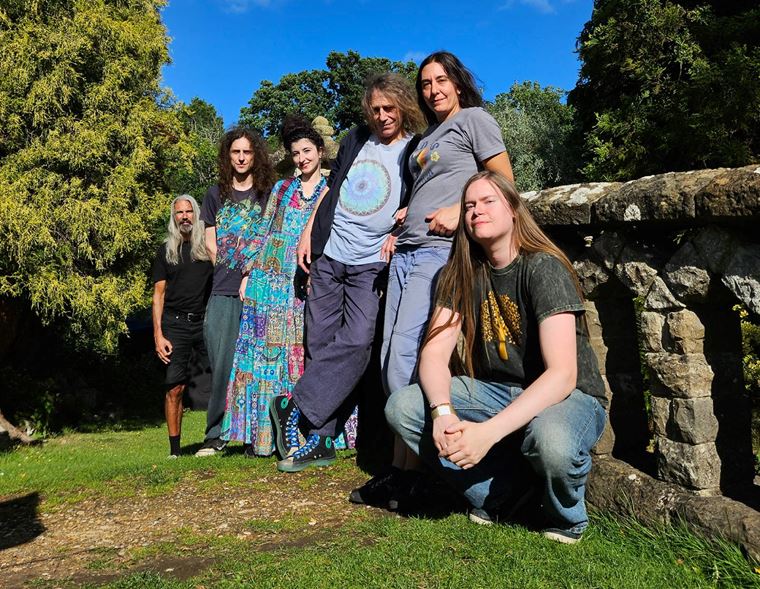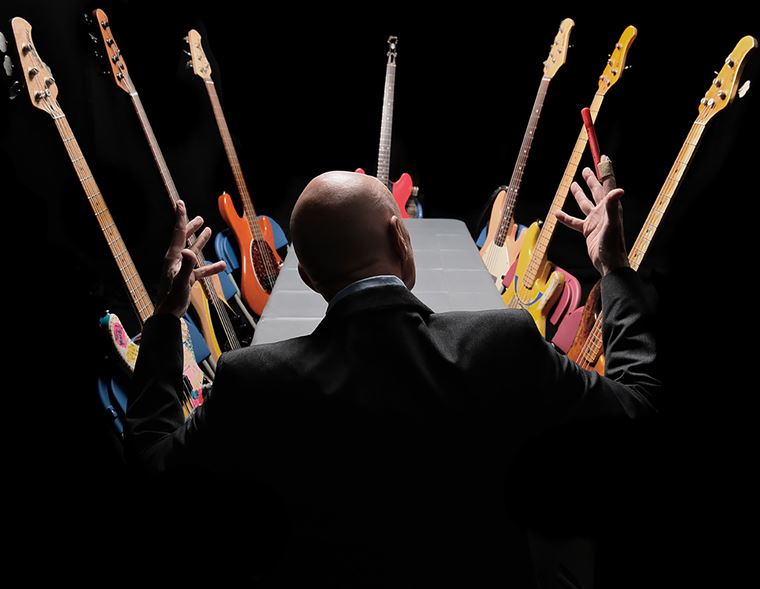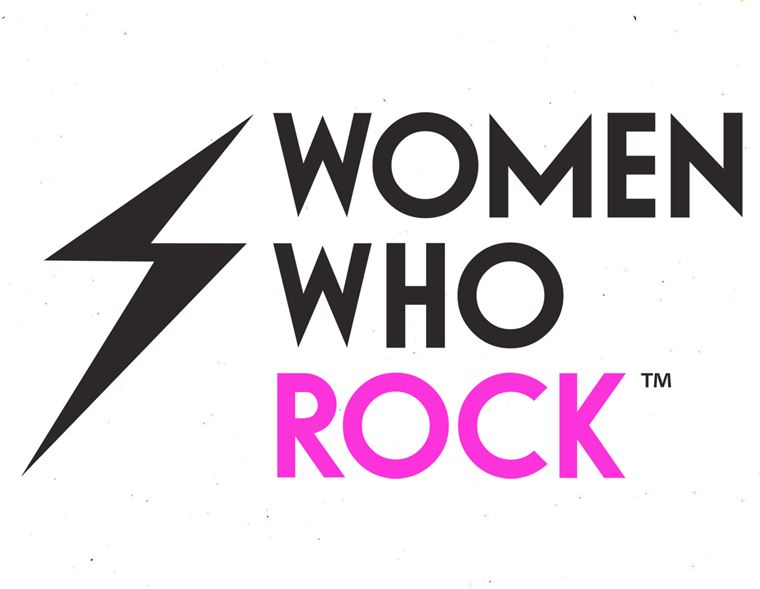Jesse Malin EXCLUSIVE interview!
Published on 10 September 2021
How do you get Bruce Springsteen to sing on your album?
Jesse Malin knows, and he’s happy to share! The New York City singer-songwriter has been beating his own musical path now for decades, beginning in the 80s NYC Hardcore scene and moving through into the streetwise troubadour he is today.
Jesse also has a fantastic memory for dates and places. At the beginning of the Zoom call we shared in order to chat about his new album, Sad and Beautiful World, I mentioned having seen him waaaay back in high school supporting Green Day. He didn’t miss a beat:
‘Yeah, Green Day were the first to take me across the pond. I’d only toured in America, Mexico and Canada. Green Day took us all over the place: Albania, Scandinavia...and I definitely remember the two nights at the Barrowlands in Glasgow! It was great’.
We’re talking about the late 90s here, when Jesse was with his Glam Punk band D-Generation. Since then, his solo career has brought him on countless word tours, a film role in a Martin Scorsese movie and a string of critically acclaimed albums that take in a kaleidoscopic view of life in all its rich splendour.
During lockdown, Malin spearheaded a successful line of livestreams (‘The last year feels like it didn’t happen, like it got erased, you know?’) but with a new record imminent, it’s time for Jesse to hit the road. We got the inside scoop on it all: the new songs, his impressive vintage guitar collection, his love of Joe Strummer and just how he managed to get The Boss to sing on one of his songs...
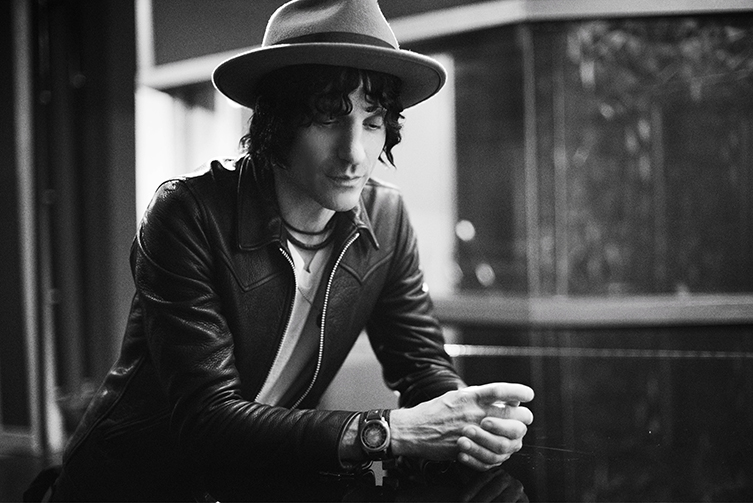
Jesse Malin Interview
guitarguitar: So, how’ve you been doing?
Jesse Malin: Yeah, things are alright! They’re a little stressful and crazy, you never know: uncertain, but you roll with it. Things started up again a couple of months ago, and the record’s three weeks away, touring...hopefully it’ll all happen! I’m just trying to keep everybody healthy and sane in this insane time!
GG: Yes exactly! Well, you haven’t been sitting back watching Netflix, you’ve been busy! There’s been all of those livestreams, plus you’ve written a new record which is not only a new record, it’s a double record! Did you know in advance that you wanted it to be a double album?
"In the Hardcore scene of the early 80s, you had one minute to express everything you felt, really fast!"
JM: Well, I’ve never done a double record before but it’s not a reason to do it! Like, ‘Oh, I’ve never played metal so let’s play metal!’ (laughs) It really was something that, when we did Sunset Kids (previous album) we had twenty five songs but the label was supportive and encouraging, saying, ‘Why don’t you make this a double record?’ I thought it was a bit indulgent. So did Lucinda Williams and her husband, like, ‘let’s keep it tight’. It was hard to make it even fourteen songs, which is long, but on the album it’s seven and seven. I think that’s a good drink here in the States, 7 and 7!
Anyway, I was happy with that record: it seemed to move at forty seven minutes. I like it kinda short but during this year, I guess we were supposed to have it finished the year before and put it out a year after Sunset Kids, but we got locked down. I started to write more songs and we ended up with a lot more than we ever had before and they are like your children, you know? You kinda love them all, it’s hard to kill your babies, and it’s the producer’s the one who usually says ‘No!’ at editing, but my producer was Derek Cruz, my guitar player and my engineer Geoff Sanoff. They’re very involved in the project, and the label started saying, ‘why not a double record?’
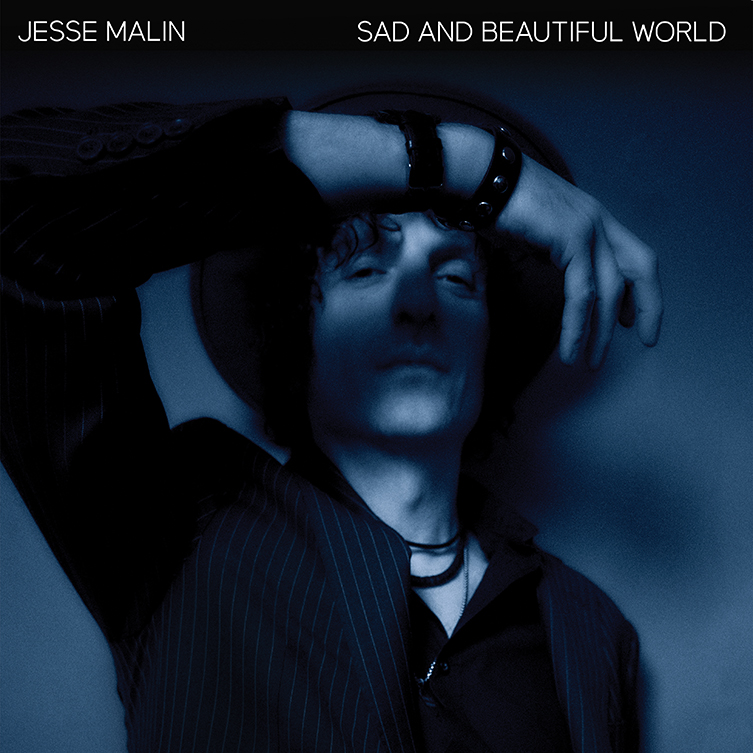
The only way I could make sense of it was, besides being a time when a lot of stuff came into my writing, there also seemed to be, like, this thread of this more mellow, rootsy, Americana country-flavoured stuff and then more of the kind of night-time, urban – urban being the city, not hip-hop – but city kinda stuff, like a Saturday night kinda feel. So, we kinda saw it like one side would be like roots rock and the other side radicals.
I had a few different titles for the record and Sad and Beautiful World seemed to make a lot of sense for this time. I’d written the title down after watching the Jim Jarmusch movie Down By Law. Roberto Benigni spouts that out at Tom Waits and he spits it back to him in his Tom Waits voice (laughs) It’s also a lyric in a song called Oh Sheena on New York Before the War.
So, we put it all together and we opened with the song we usually close with, Greener Pastures, and we kinda went backwards and started there in the morning with the quieter record. The second disc is more like: Backstabbers, first song, into action, you’re in the city, life’s happening, you gotta watch out but it’s gonna be fun! (laughs)
" I used to busk at subway stations when I was 16, and I used to play punk songs but disguise them as 50s tunes for the working stiffs"
GG: Down By Law, man! I love how they escape from jail in that movie.
JM: Yeah! ‘I scream, you scream, we all scream for ice cream!’ Haha! I get a lot of inspiration from movies, you know? Movies put you in a zone. I write down ideas and just kinda lift myself through.
GG: Totally! So, the album Sad and Beautiful World, as you’ve said, one side is the quieter songs with the country element, and then you’ve got your city tunes, as you say. One of the things that keeps coming back to me when I think about Jesse Malin is New York City. I always think of you as a guy cutting around the city, taking it in and being a part of it. New York seems to be a big part of your inspiration and subject matter. Am I reading into that, or is that how it is?
JM: Well, you write about what you know. I was born here, I grew up here, but we travel a lot. You get a lot of perspective going around the world. You learn that we’re all connected, about how small the frickin’ world is, how accountable we have to be, that what we do, we’re responsible for it, that it affects people in other places and that we all bleed the same. You rip us open, it’s all the same colour, heartbeat. I always feel that music is the thing that unites us globally: it’s a heartbeat, it’s not religion or politics. I mean, it is a religion in some ways, but everybody can join in, just shake your head and smile, even if you’re into Trump and I’m into this and you’re into that, y’know? Whatever, I think there’s a place that’s just the human feeling, it’s liberating.
So, New York has always been a big influence on my stuff but I’ve lived in California and...I guess, never overseas, but just out of a suitcase. Premier inn, or the Travel lodge (laughs), you know? The Holiday Inn, but I think I prefer the Regency Kensington High Street Hotel, you know (laughs). It really is just a background of what I am: it’s the language that I speak but I try to write, hopefully, on a level that people can relate to, human-wise, wherever they live. Whether that’s Finland, or New Zealand, Auckland or something.
GG: Yeah, it’s like the tradition of songwriters. I don’t know if it’s okay to say ‘Classic American Songwriting’ because, as you’ve said, you know, people in Brazil love Bob Dylan and people in Sweden love Kraftwerk, whatever, but there’s something about American guys with acoustic guitars. There’s something of a tradition of it: Simon & Garfunkel, Dylan, Springsteen – who we’ll come back to – is that something that’s always fitted into your world?
"I play a 2006 Gibson Sheryl Crow guitar, but I banged it up and put all these stickers on it. I call it my Sheryl Cro-Mag"
JM: I got a lot of my stuff from punk rock artists who were kinda folk singers, too, like Joe Strummer, Billy Bragg and Elvis Costello. They’re English, you know? And Paul Westerberg in America. People who weren’t afraid to be loud and crazy but then take it down to a whisper. That’s when I realised there was a connection between folk music and protest music, and badass country music like Johnny Cash, even dare I say Jerry Lee Lewis, Patsy Cline, into punk rock. And troubadour stuff. It was very unfashionable to like that stuff when I was a kid into punk: it was mellow, it was hippy, it was whatever, folky.
But in time, I think, a lot of people that were into punk rock understood that connection and then you got all these great troubadour kinda artists like Frank Turner and Brian Fallon, Craig Finn, all disciples probably of Joe Strummer and Billy Bragg. Beyond that, I don’t wanna say who their influences are, but there’s a lot of that, I guess a lot in America but Frank overseas for sure. Artists like Tom Bright out of England, I like a lot too. They have that same thing, where it’s just down to a core. What do they say: three chords and an attitude?
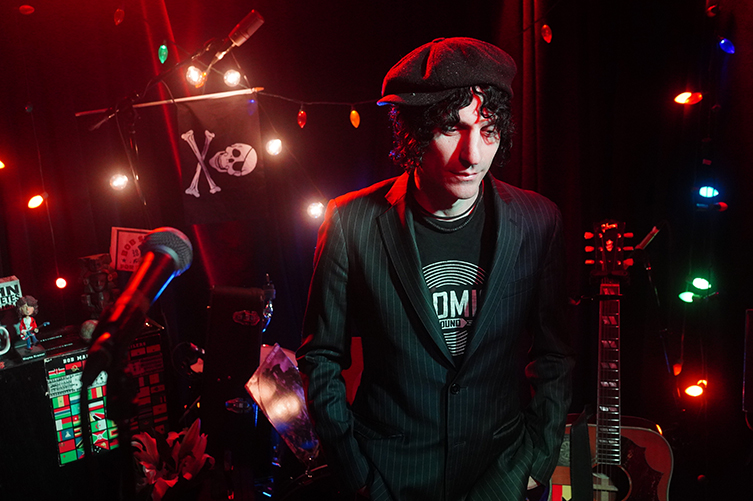
(Photo: Ilaria Conte)
Y’know, I used to busk in the subway stations and plays songs for money on a Friday when I was 16 so I could some beers and Indian food, and I used to play punk songs but disguise them as 50s tunes for the working stiffs! I’d mix it in with a little Dion, a little Buddy Holly, and there’s the Ramones in there, it seemed to sit really nice. I think there’s a connect, and I think you see it when you pull back. I learned a lot from writers like Joe Strummer and his lyrics – I know everybody likes Joe Strummer and they should – it’s kinda common to say this but he really affected me as one of the teachers, and about the world and other kinds of music and other places. Those lyrics made me want to look things up, without the internet, but look them up in the world and learn and grow. Even musical styles! But, coming down to that simplicity of ‘give somebody a guitar and a couple of chords, and have them express how they’re feeling’.
I come from a punk rock background and in the early 80s I had a band called Heart Attack. The first record came out forty years ago, when I was an ittle bitty teenager and it’s just being reissued in October. In the hardcore scene in the early 80s, you had one minute to express everything you felt, really fast, and all the things in the world. (laughs) It was really interesting, because people really did express themselves in one minute!
"There's something about travelling with a group and getting out there, going from town to town. It's like being on a pirate ship"
GG: Wow, haha! Yeah, the punk thing: you’ve now got these types of artists that are coming out of country who are into punk, and vice versa. I’m just thinking of Hank Williams III and people like that. He does a set of each at his gigs, I think? Back when I was younger, there were distinctions: if you were into punk, that’s was it. Nothing else. It was the same for metal or indie or whatever.
JM: Yeah.
GG: It seems to be that now, people are more willing to be less genre-centric, at least for, say, music written on guitars rather than on a laptop, for example.
JM: Yeah, it used to be we were all separates, like when you see Quadrophenia, with the mods and the rockers, and people would fight for what they believe and what they really feel. I think there’s something great about the passion, that you’re really dedicated to reggae or rudeboy or you’re into metal, and those people are so loyal they stick to the metal scene. That’s great! The fighting part, (laughs) I don’t know about that! I used to get beat up by kids that liked Led Zeppelin when I liked KISS as a ten year old. When I got into punk, everybody beat me up! It was like, ‘You suck!’, but that was a long time ago.
In a festival-type mentality for things in America like Lollapalooza or things overseas like Glastonbury, it’s a mix of stuff, you know? So people can like hip-hop, and rap and they can like something more gothic and spooky or something noisy like Nine Inch Nails. Or whatever! Like, Björk or Neil Young. There is that, and I think it’s a great thing because there’s just two kinds of music in the world, like Louis Armstrong said: good and bad! Country and Western! No, I’m just joking. Good and bad, but, like, it’s good to have an open taste where you like a lot of stuff. I don’t really like the mentality of ‘I like everything, whatever’s on the radio’. Fuck that! There are people who are telling it right, and you know, it’s like the first time I heard Lucinda Williams: it’s roots music that I normally wouldn’t be that excited about, but she popped out from that because she had an edge. She had a story to tell. She had a really cool voice and it was the swagger: there was something punk and rock ‘n’ roll about Lucinda Williams. It wasn’t just syrupy country and western kinda stuff.
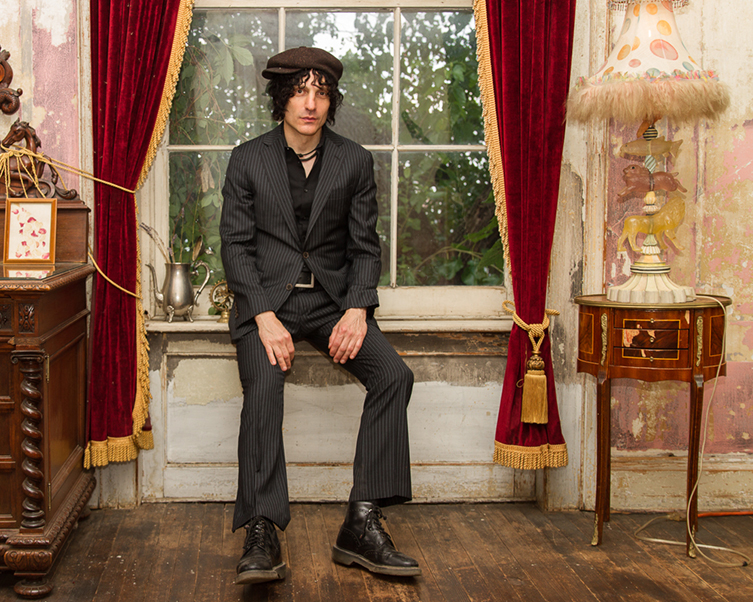
It’s like, I don’t really like metal. But Motorhead? Some might say they’re metal but to me they’re rock ‘n’ roll. But Kerrang would support them! To me, Motorhead is leaps above all those other bands who tried. Same thing with AC/DC: ‘It’s heavy, hard rock!’ Well, it’s just fucking good music!
GG: That’s totally true! And also, when you mentioned Lollapalooza, that was Perry Farrell from Jane’s Addiction who started that. They were one of those bands too, weren’t they?
JM: Yeah, you couldn’t peg them into a box, right!
GG: Yeah, it’s just good music.
JM: Exactly, and that’s why it’s still good to put that record on. Some punk kid’s gonna go ‘that’s cool!’ I once made a film with Martin Scorsese and we were sitting around CBGB’s doing the filming. I was trying to talk music with him, because he always has great music in his films, and Jane’s Addiction came on. He turned to me and said, ‘That’s Jane’s Addiction: they’re one of the good ones, right?’ (laughs) This sixty year old man! I was like, ‘yep!’
GG: Haha! That’s right! That was Bringing Out the Dead, wasn’t it?
JM: Bringing Out the Dead. I had one little line, like, ‘Right this way’, I was the club doorman or something. You seem to know your stuff, man.
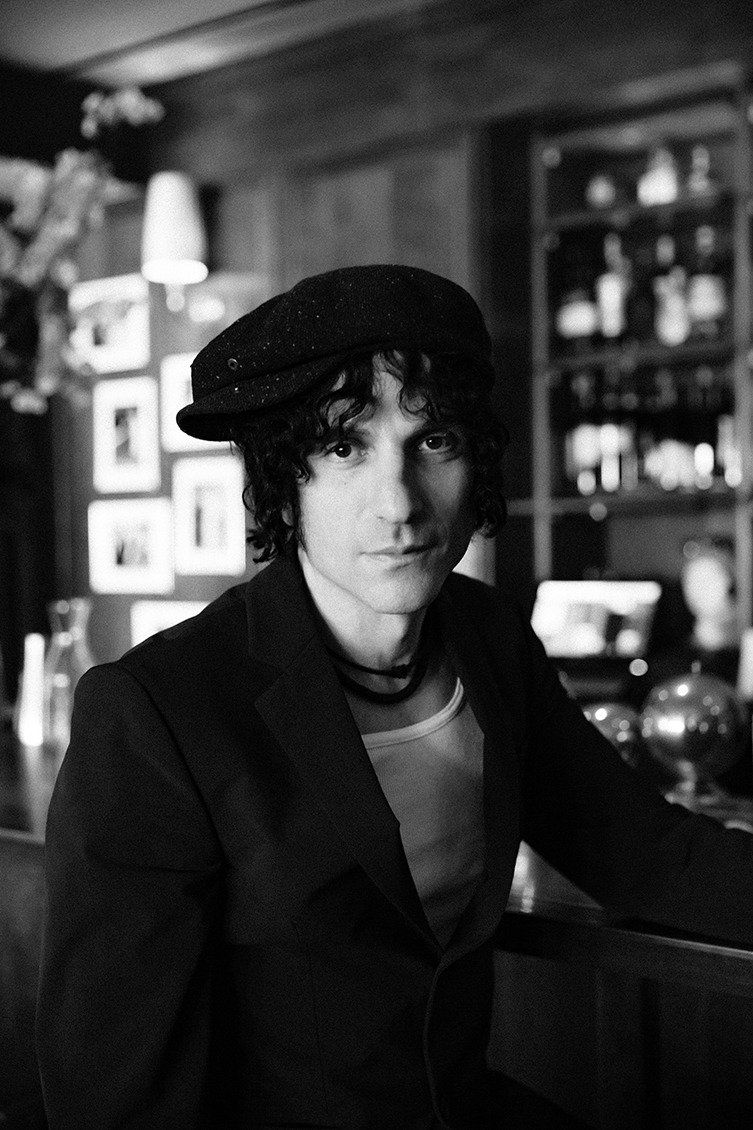
(Photo: Olivia Jaffe)
GG: That was a good movie! Now, what I’d like to talk about is songwriting. Are you always in the mode of songwriting, as it were? Do you get an idea, record it in an iPhone, that kinda thing? How does it work for you?
JM: I kinda like to have a few ways. I always carry a notebook, I always walk around writing down ideas and lyrics. I always get inspired by things I hear people saying or things that come into my head, something maybe I said or am thinking about. I write that down, I’ll be collecting that in that book.
Man, you know, I just pick up guitars sometimes when I’m walking around the house, or walking to a soundcheck, and I just start to hear things in a different way. I let myself start to freeform, and I let melody really lead me, and the chords. I just let it go, and I’m singing different things. Sometimes those words are meaningful and I’ll take from them, and sometimes they’re kind of like placeholders, almost like a Rorschach test. So there’s initial inspiration. And then I’ll go back and I’ll listen to it – it used to be on a cassette, now it’s on a phone – and I’ll distil and go, ‘Wow, those are the good bits here, let’s finish this! Alright, what am I trying to say? I like these parts a lot, let’s cross the t’s and dot the i’s, let’s make this happen’.
"I used to get beat up by kids that like Led Zeppelin when I liked KISS as a ten year old. When I got into punk, everybody beat me up!"
To be quite honest, you get really lucky sometimes where you get the whole thing right there and you just gotta colour in the bits in the middle, but other times, you get the initial idea and then the homework begins, to kinda tighten it up and that’s when I’ll look hard at the lyrics. That’s when I’ll look back in the book and I’ll see, like, ‘Oh yeah, this kinda fits with this’, or something will fit in with the mindset I’ve been in for the last week or so. Or sometimes it’s stuff from a long time ago, where it would go really good into an idea. But I have to feel the sentiment, so it’s kinda being led in this trancelike state, and then you figure it out later and make sense of it.
GG: Okay, so there can be a song where you’ve written parts of it recently and parts of it ages ago, except there’s still a kind of through-line to it.
JM: Yeah, I write alone I guess but on this record, I wrote a bunch with Derek Cruz, my guitar player and the guy who produced the record. We go into a state where I don’t play an instrument in these moments, and he just plays stuff on, say, a bass or a weird keyboard sound. Or bring in a drum beat. I’ll just freeform melodies, and because I don’t know where he’s gonna go, he’s kinda guiding it and then I’m kinda guiding it with melody. We’re doing this thing where, if you have an instrument in your hands, you kinda know where the next chord’s gonna go, you know what’s gonna happen because you have old tricks in old places and old habits. With someone else, you can get lost.
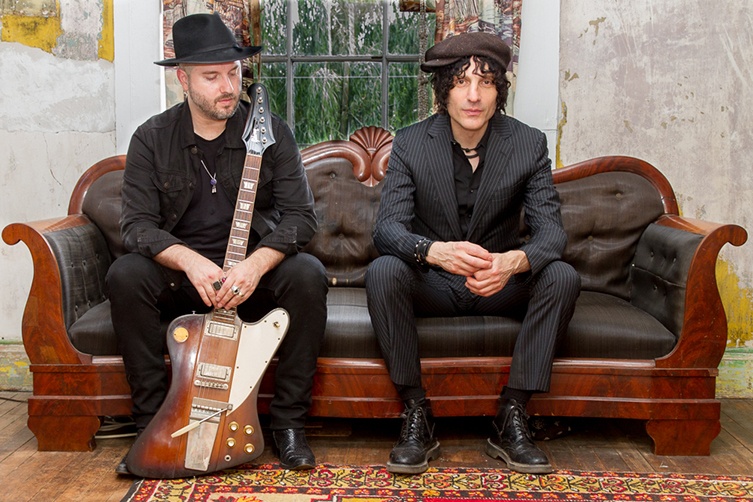
Like I was saying earlier, if I walk into a soundcheck in a room and I sing into a mic in a PA in a weird place, a different theatre or a different sound, hearing myself a different way, coming off the street in some strange town, it stimulates me. It’s like putting a weird tuning on a guitar, or a capo. And it’s also jamming with somebody else. I did some writing with Rob, which I’ve never done before. He’s been the piano player in my band on-and-off for 20 years and, you know, we just sat in my kitchen. It was dark times, there wasn’t a lot to do, so it was him playing a piano and I’d start coming up with lyrics and melody, so we’d kinda go into this telepathic thing. So, that’s another approach.
I definitely like to tune my guitars and do different things when I’m alone to inspire a different tonality.
GG: Yeah, it helps keep things fresh. That’s an interesting point you raised: when you are ‘melodising’ for want of a better term, with your vocals and someone else is in charge of the harmonic base, you really don’t know where they’re gonna go! Does that mean you just let melody be the ruler? Like, the melody’s in charge of the song, is it that idea?
"We're kind of addicted to getting under the hot lights in those rooms, singing on the microphones and sweating out the poisons"
JM: Yeah, I think the melody is a big strong person: a king or queen of how this goes! I think that the melody is everything. I used to think that if you learned a lot of great chords, you were gonna write a song that’s also great, and I think there is something to that for sure, to have more chords and even words in your vocabulary, or paintbox. But look at someone like Tom Petty or Buddy Holly, just a couple of chords and how much they get out of that! How melodic the songs are with such simplicity. So there’s room for both. It’s good to fuck with yourself and shake it up. Sometimes I like to play different rhythms and that does it. I like to walk around in a strange town where I’m not, like, knowing everybody and know where I’m going. I feel more like an observer, as a writer, watching things. Instead of being in the movie, you’re watching this movie of life, observing people through that lens.
GG: Yeah, just being open, basically. So, because this is for guitarguitar, let’s talk guitars! I’ve noticed you play a lot with a beautiful Gibson acoustic. Is that a Hummingbird?
JM: I have a Hummingbird, it’s a 1962 that I’ve had for a long time. I play a 2006 Gibson Sheryl Crow guitar, but I banged it up and put all these stickers on it. I call it my Sheryl Cro-Mag. It has a Fishman pickup, which was done by Carmine Street guitars, Rick Kelly, who makes Kelly guitars that are great, too. He’s down here in the Village, West side, and he makes them sound so warm and sweet. I’ve been using his pickup setups with the Fishman, the way he does them, for probably 18-19 years.
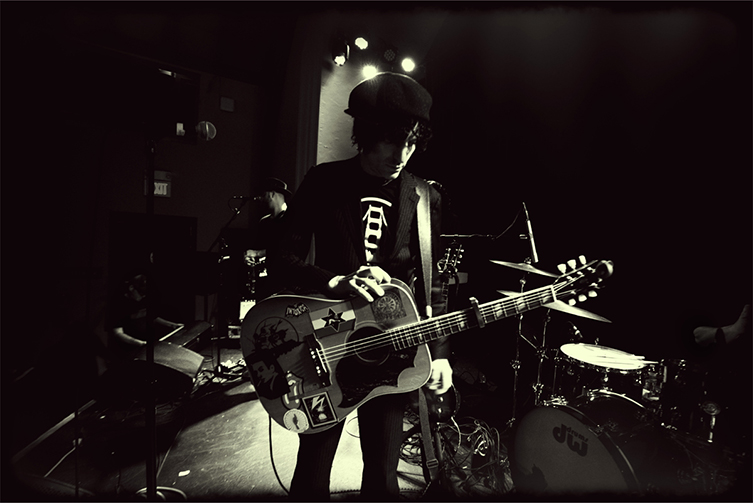
Then I also play a 1956 Les Paul Junior, one of the first years they made that, if not the first year. It’s a vintage one, it’s beat up but it’s really warm. I have a Les Paul Deluxe that Gibson gave me in the 2000s that I like. It’s the PMA guitar – Positive Mental Attitude – it’s got those letters on it. Also, I’ve been playing a Martin around the house that I kind of dig, it’s a D...I dunno what it is, D-something! I have a Tele, just to shake it up and get that Fender sound, a 70s Blonde Tele, that I like. And I like J-45s a lot, if you get a good one. The wood has to age, they gotta get some sweat on ‘em.
GG: That’s an amazing collection of guitars! I most often see you pictured live with an acoustic, but do you play electric guitar live too?
JM: Thirty percent, forty percent of the show, I’m on the electric. Some songs, I’m just singing and on the early records, it’s more acoustic, but it’s a combo.
GG: And your Junior, that sounds amazing! Would that be a single cutaway, then?
JM: It’s a single cutaway, yeah. Tobacco Burst.
GG: Nice!
JM: There’s a guy that deals gear out West named Ricky Mahler, he was in a band called Circus of Power. They call him ‘The Chud King’. He calls all that gear Chud. He has used vintage stuff that he sells privately. He’s a friend and we’ve done some music together on one of my records. Yeah, the Hummingbird and another one of those Sheryl Crow models – I bought a second one – but also the 1956 Les Paul Junior, that’s all Chud King. And the Tele!
"Songwriting's like being led in a trancelike state, and then you figure it out later and make sense of it"
GG: Good guy! The Chud King! And, Jesse, what are your preferences for string gauge and picks?
JM: I like medium gauge picks, I used to like Fender medium plectrums, as you call them, I also like these Dunlop mediums, that’s kinda my thing. For strings, I use martin medium gauge on the acoustic. I tune down half a step, I started doing that in D-Generation just for singing purposes and I kinda got stuck in it a little bit. Maybe I’ll change it someday but most of my records are tuned to Eb. Cause it’s heavier! And more rock! No, but yeah, we tune down.
And for the electric guitar, I use Not Even Slinky Ernie Ball, which is good for keeping the strings tight when you’re tuning down a half step. It’s great for me, it feels comfortable having a .056 down below on the low E string. I’ve been playing Ernie Ball strings on electric since Heart Attack, my Hardcore band. I used to play tens but now they’ve thicker.
GG: Cool man! Now, I’m sure you’ve been asked this about 8 million times, so sorry to ask again, but it’s because we haven’t spoken before, and our audience may not have come across this. Bruce Springsteen duetting with you on Broken Radio: that’s quite good going! How did you manage to get The Boss involved?
JM: Um, well, he’d heard my first record, The Fine Art of Self Destruction, or read about it, and we met at the Stone Pony at a benefit for Light of Day, which was Parkinson’s Relief. We started talking about, like, the Clash or Joe Strummer, some fun stuff, and my manager said, ‘Bruce is gonna call you up’, a month later. ‘Really?’ ‘He wants to ask you something’. He got my number and I guess it turns out he wanted me to play some shows with him and his band for a Holiday Christmas thing. I thought we were gonna do Christmas songs and he was like, ‘No, we’re gonna do YOUR songs!’ like, ‘Wendy’ and ‘Queen of the Underworld’. I only had one album out.
I went down to Astbury Park, New Jersey, where he’s from and we rehearsed. It was like a weird dream: he was playing guitar and singing, and there’s clips out there of it. We did it for three nights, with Sam from Sam and Dave and Jon Bon Jovi. Danny DeVito was there, it was wild. And then it just became one of those things: I’d see him now and then, we stayed in touch, we had a nice time those three days.
I was going to make my third record in Los Angeles called Glitter in the Gutter and I went to see him play for the Seeger Sessions up in New England. He said, ‘What are you up to, after this?’ I said, ‘I’m going to LA to make my new record’. ‘Well, if something comes up and you want me on the record, or you do something and you need me, I’m down’. And I thought maybe he was just going to play some guitar, or sing a little thing. I mentioned to my producer Rob Caggiano, who’s in a band called Volbeat now (click to read our exclusive interview with Rob Caggiano), he said, ‘Why doesn’t he sing on that song you wrote about your Mom? That song about her passing away at a young age, and being a frustrated dreamer, singer’. I said, ‘that’s a really personal song, I’m not sure’.
So, I thought about it, and my mom always wanted to be a singer and sing to the radio, that’s what it’s all about. Then it hit me: maybe it would be a good thing, to have one of the great voices of radio, sing on this song, it kinda made sense. I sent him the song with the lyrics and he called, saying ‘I like the song, I’m down to do it.’ So, we flew from LA to New Jersey to his property and he pulled up on his Harley, down a gravel road! There was peacocks and horses and he was so cool. We had a beer at noon and he went in a booth and just banged it out in his home studio.
Suddenly, this little song I wrote in my apartment about my mom who died when I was very young, there’s this singer who I love – Nebraska, The River and Darkness On the Edge of Town, oh my God! – this is really happening!
It was an honour and just beyond a surreal beautiful dream. He’s a very giving, humble, soulful, real person, like you’d expect from the image, but sometimes you meet your heroes and they can let you down. Bruce kind of goes the other way, he’s even cooler than those things you read.
GG: Aw, that’s amazing! So good to know, too. What a story! I was expecting the opposite, to be honest: that you’d have to chase him and hustle it!
JM: Haha, yeah, take him out for some sushi, yeah!
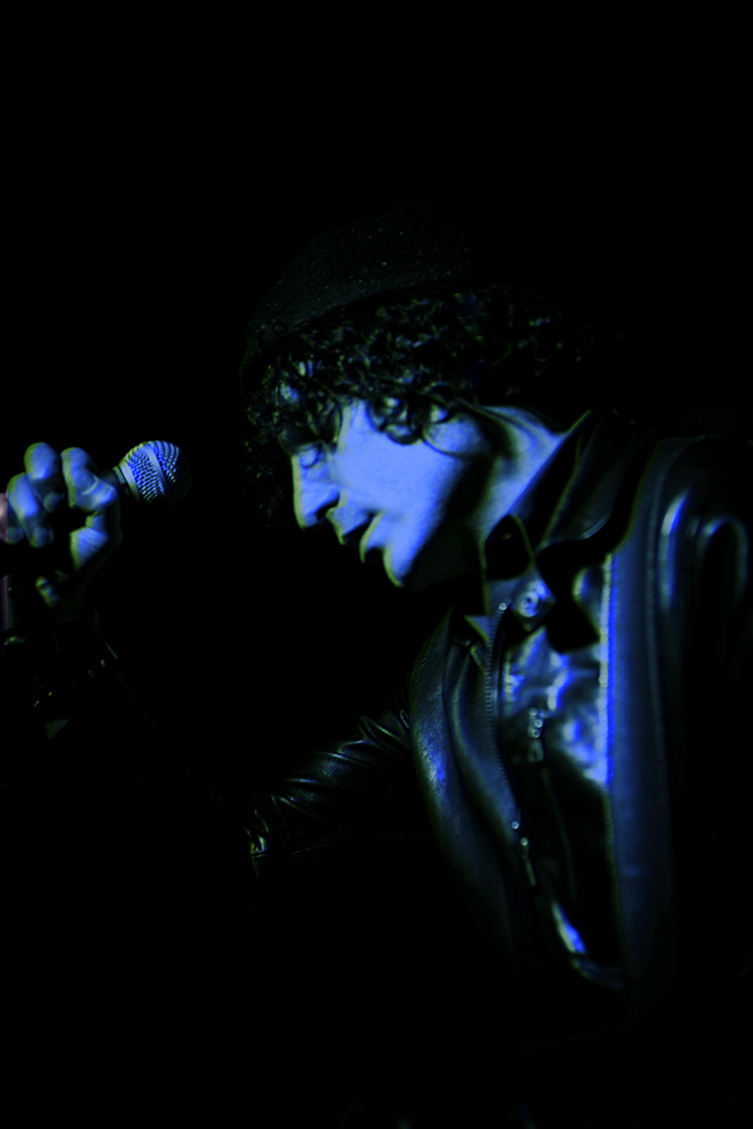
(Photo: Vivian Wang)
GG: So amazing. So, just to kind of round things off, Jesse, you’ve been doing your livestreams for a while and they’ve been going super-well, but now you are going back out touring in the world again. Have you played some shows recently?
JM: I played some shows in the New York area, we played Los Angeles recently, and we have shows coming up. We’re doing 3 weeks in the UK, starting on the 27th in Glasgow.
GG: How’s it feeling to be back out playing in front of sweaty rock audiences again?
JM: Really emotional, really great. The livestreams were so fantastic, that we had that outlet and you could close your eyes and somehow get to feel that people were there even though you couldn’t hear them clapping or anything (laughs). But it was very emotional, I started crying when we began playing music again, like wow, this is what we do! There’s a give and take between you and the audience when you put something out. They give you something back, hopefully and it goes back and forth and reaches a higher level. There’s nothing like that, we’re kind of addicted to getting under the hot lights in those rooms, singing on the microphones and sweating out the poisons! Just connecting with people, you get to see if the new songs hold true, you sing them in front of people in a microphone. If they reverberate and resonate, maybe they stay in the set for years. There’s something about travelling with a group and getting out there, going from town to town, it’s like being on a pirate ship with your mates.
It’s an apt comparison, and we hope to see the Dread Pirate Jesse on these shores very soon! In the meantime, you can keep an eye on his tour and album details by heading across to the official Jesse Malin website. Sad and Beautiful World is out on Sept 24th and he’ll be touring extensively, so head to his site for tickets!
We’d like to thank Jesse for giving up his time for us, and for such a great conversation. Thanks go out to Peter Hall for setting us up, and to you, of course, for reading this article! We hope you enjoyed it, and you can find more over at the guitarguitar interviews page.
There will be more interviews soon, but until then, thanks for stopping by.


